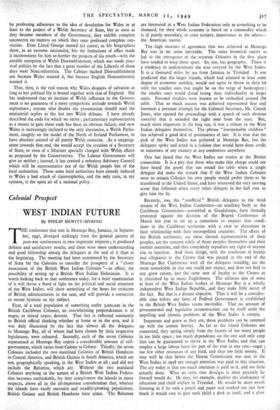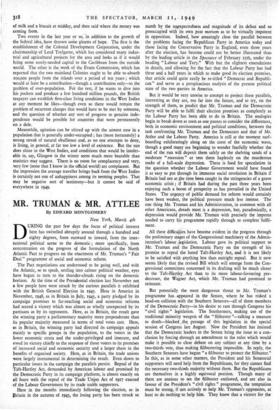Colonial Prospect
WEST INDIAN FUTURE
By PHILIP HEWITT-MYRING
THE conference that met in Montego Bay, Jamaica, in Septem- ber, 1947, diverged strikingly from the 'general pattern of post-war conferences in two important respects ; it produced definite and satisfactory results, and there were more understanding and good fellowship among the delegates at the end of it than at the beginning. The meeting had been summoned by the Secretary of State for the Colonies to consider the prospects of a " closer association of the British West Indian Colonies "—in effect, the possibility of setting up a British West-Indian Federation. It is worth looking back to that conference today, folit brief examination of it will throw a flood of light on the political and social structure of the West Indies, will show something of the bases for criticism of British administration in the area, and will provide a corrective -to recent hysteria on the subject.
First, of a total population of something under 3,000,000 in the British Caribbean Colonies, an overwhelming preponderance is of negro, or mixed negro, descent. That fact is reflected constantly in British official thinking whether at home or in the area, and it was duly illustrated by the fact that almost all the delegates to Montego Bay, all of whom had been chosen by their respective legislatures, were coloured. Secondly, each of the seven Colonies represented at Montego Bay enjoys a considerable amount of self- government, which varies from Colony to Colony. Thirdly, the seven Colonies included the two mainland Colonies of British Honduras in Central America, and British Guiana in South America, which are not, geographically speaking, in the West Indies at all ; and did not include the Bahamas, which are. Without the two mainland Colonies anything in the nature of a British West Indian Federa- tion becomes unthinkable, for they complement the islands in many respects, above all in the all-important consideration that, whereas the islands have vastly excessive and steadily-growing populations, British Guiana and British Honduras have space. The Bahamas
are interested in a West Indian Federation only as something to be shunned, for their whole economy is based on a commodity which is of purely secondary, or even tertiary, importance to the others— the American tourist.
The high measure of agreement that was achieved at Montego Bay was in no sense inevitable. The same historical causes as led to the emergence of the separate Colonies in the first place have tended to keep them apart. So, too, has geography. There is a tendency to underestimate the area covered by the West Indies. It is a thousand miles by sea from Jamaica to Trinidad. It was predicted that the larger islands, which had attained at least some degree of economic stability, would not agree to throw in their lot with the smaller ones that might be on the verge of bankruptcy ; the smaller ones would dread losing their individuality in larger units. Personal rivalries were known to be embodied around the table. That so much success was achieved represented first and foremost a personal triumph for the Colonial Secretary, Mr. Creech Jones, who opened the proceedings with a speech of such obvious sincerity that it sounded the right note from the start. But, much more important in the long run, it was a tribute to the West Indian delegates themselves. The phrase " irresponsible children " has achieved a good deal of prominence of late. It is true that the pick of the West Indies was gathered at Montego Bay, but the delegates spoke and acted in a fashion that would have done credit to statesmen of any country at any conference anywhere.
One has heard that the West Indies are restive at the British connection. It is a pity that those who make this charge could not have heard the growl that ran round the table when a single delegate did make the remark that if the West Indian Colonies were to remain Colonies his own people would prefer them to be transferred to the United States, and have witnessed the very moving scene that followed, when every other delegate in the hall ark to give him the lie.
Recently, too, the " unofficial" British delegates to the third session of the West Indian Conference—an auxiliary body to the Caribbean Commission—assembled at Guadaloupe, have formally protested against the decision of the Bogota Conference of March last year to set up a committee to enquire into condi- tions in the. Caribbean territories with a view to alterations in their relationship with their metropolitan countries. The affairs of the British territories, say these elected representatives of their peoples, are the concern solely of those peoples themselves and their mother countries, and they completely repudiate any right of anyone else to interfere. And these things, with the resolution of loyalty and allegiance to the Crown that was passed at the end of the Montego Bay Conference with all the delegates standifig, are the more remarkable in that one could not expect, and does not find to any great extent, just the same sort of loyalty to the Crown as is cherished by so many Englishmen. The ultimate aim of some at least of the West Indian leaders at Montego Bay is a wholly independent West Indian Republic, and they make little secret Of the fact. But that is a distant objective. That it will be a consider- able time before any form of Federal Government is established in the British West Indies seems inevitable. That no amount of governmental and legislative reconstruction can by itself settle the appalling and chronic problems of the West. Indies is certain.
Important and grave as they are, these problems can be summed up with the utmost brevity. As far as the island Colonies are concerned, they spring simply from the factors of too many people in too little space ; too much dependence on the one and only crop that can be guaranteed to thrive in the West Indies and that can employ a large labour force for part of the year at any rate—sugar ; too few other resources of any kind, and thus too little money. It may well be that before the Moyne Commission was sent to the West Indies in 1938 not enough attention was paid to this situation. The cry today is that too much attention is paid to it, and too little- actually done. What no critic ever divulges is what precisely he himself would do. He may, for example, deplore the inadequacy of education and child welfare in Trinidad. He would be more worth listening to if he took a pencil and paper and worked out just how much it would cost to give each child a desk to itself, and a glass
of milk and a biscuit at midday, and then said where the money was coming from.
Two events in the last year or so, in addition to the growth of the federal idea, have thrown some gleams of hope. The first is the establishment of the Colonial Development Corporation, under the chairmanship of Lord Trefgarne, which has considered many indus- trial and agricultural projects for the area and looks as if it would bring some sorely-needed capital to the Caribbean from the outside world. The other is the work of the Evans Commission, which has reported that the two mainland Colonies ought to be able to.absorb ioo,000 people from the islands over a period of ten years ; which would at least be a contribution—though a contribution only—to the problem of over-population. For the rest, if he wants to dive into his pockets and produce a few hundred million pounds, the British taxpayer can establish first-class living conditions in the West Indies at any moment he likes—though even so there would remain the problem of recurrent charges that would have to be met by someone, and the question of whether any sort of progress to genuine inde- pendence would be possible for countries that were permanently on a dole.
Meanwhile, agitation can be stirred up with the utmost ease in a population that is generally under-occupied ; has (most fortunately) a strong streak of natural ebullience and, as no one attempts to deny, is living, in general, at far too low a level of existence. But the sun does shine in the West Indies, and conditions that would be intoler- able in, say, Glasgow in the winter seem much more bearable than statistics may suggest. There is no room for complacency and very, very few (none that I know in the official world) are complacent. But the impression the average traveller brings back from the West Indies is certainly not one of unhappiness among its teeming peoples. That may be negative sort of testimony—but it cannot be said of everywhere in 1949.







































 Previous page
Previous page